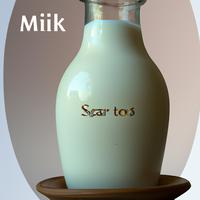
1 serving (240 grams) contains 122 calories, 8.0 grams of protein, 5.0 grams of fat, and 12.0 grams of carbohydrates.

Log this food in SnapCalorie

Nutrition Information
Calories |
122.0 | ||
|---|---|---|---|
% Daily Value* |
|||
| Total Fat | 5.0 g | 6% | |
| Saturated Fat | 3.1 g | 15% | |
| Polyunsaturated Fat | 0 g | ||
| Cholesterol | 20.0 mg | 6% | |
| Sodium | 98.0 mg | 4% | |
| Total Carbohydrates | 12 g | 4% | |
| Dietary Fiber | 0 g | 0% | |
| Sugars | 12 g | ||
| protein | 8.0 g | 16% | |
| Vitamin D | 120 mcg | 600% | |
| Calcium | 305.0 mg | 23% | |
| Iron | 0.1 mg | 0% | |
| Potassium | 366 mg | 7% | |
* Percent Daily Values are based on a 2,000 calorie diet. Your daily values may be higher or lower depending on your calorie needs.
Food Attributes
Source of Calories
About Bottle of milk
Milk is a nutrient-rich liquid derived from mammals, primarily cows, and is widely consumed across global cuisines. A versatile staple, milk serves as a key ingredient in beverages, desserts, and sauces, and supports countless culinary traditions. It naturally contains essential nutrients like calcium, protein, phosphorus, and B vitamins, which contribute to the maintenance of strong bones, muscles, and overall health. Additionally, milk is fortified with vitamin D in many regions, further enhancing its nutritional profile. While whole milk delivers healthy fats, it is higher in calories compared to low-fat and skim varieties. Individuals with lactose intolerance, vegan diets, or dairy allergies often opt for plant-based alternatives like almond or oat milk. Moderation is recommended, as excessive milk consumption can lead to higher intake of saturated fats and calories, particularly with flavored or sweetened versions. Milk remains a wholesome choice for balanced nutrition when consumed mindfully.



